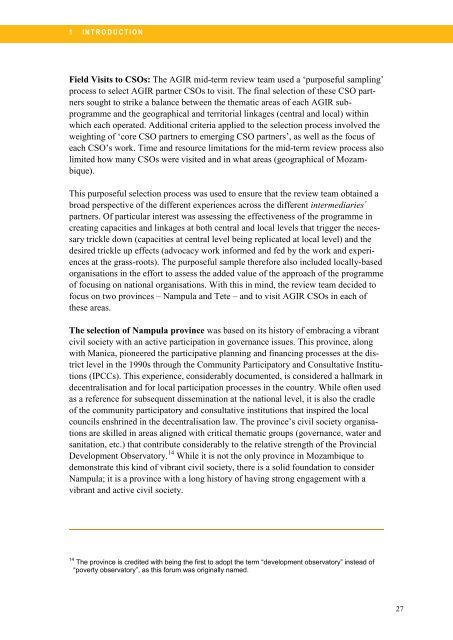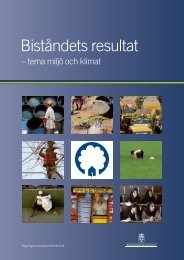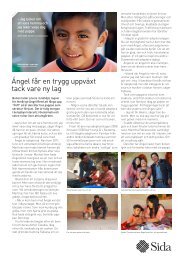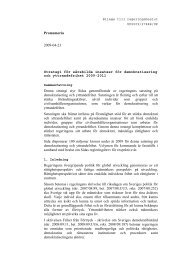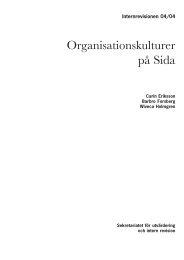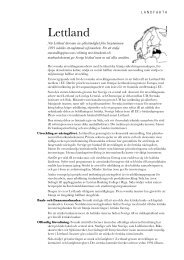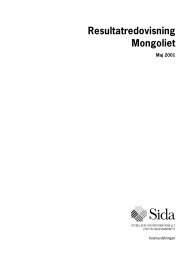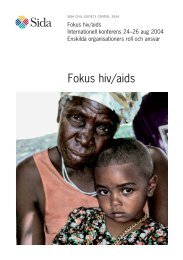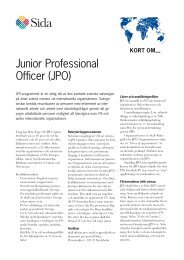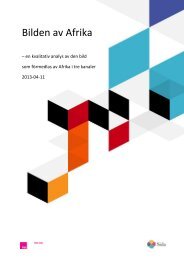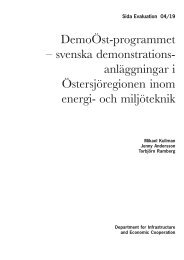Mid-Term Review of the AGIR Programme - Sida
Mid-Term Review of the AGIR Programme - Sida
Mid-Term Review of the AGIR Programme - Sida
Create successful ePaper yourself
Turn your PDF publications into a flip-book with our unique Google optimized e-Paper software.
1 I N T R O D U C T I O N<br />
Field Visits to CSOs: The <strong>AGIR</strong> mid-term review team used a ‘purposeful sampling’<br />
process to select <strong>AGIR</strong> partner CSOs to visit. The final selection <strong>of</strong> <strong>the</strong>se CSO partners<br />
sought to strike a balance between <strong>the</strong> <strong>the</strong>matic areas <strong>of</strong> each <strong>AGIR</strong> subprogramme<br />
and <strong>the</strong> geographical and territorial linkages (central and local) within<br />
which each operated. Additional criteria applied to <strong>the</strong> selection process involved <strong>the</strong><br />
weighting <strong>of</strong> ‘core CSO partners to emerging CSO partners’, as well as <strong>the</strong> focus <strong>of</strong><br />
each CSO’s work. Time and resource limitations for <strong>the</strong> mid-term review process also<br />
limited how many CSOs were visited and in what areas (geographical <strong>of</strong> Mozambique).<br />
This purposeful selection process was used to ensure that <strong>the</strong> review team obtained a<br />
broad perspective <strong>of</strong> <strong>the</strong> different experiences across <strong>the</strong> different intermediaries´<br />
partners. Of particular interest was assessing <strong>the</strong> effectiveness <strong>of</strong> <strong>the</strong> programme in<br />
creating capacities and linkages at both central and local levels that trigger <strong>the</strong> necessary<br />
trickle down (capacities at central level being replicated at local level) and <strong>the</strong><br />
desired trickle up effects (advocacy work informed and fed by <strong>the</strong> work and experiences<br />
at <strong>the</strong> grass-roots). The purposeful sample <strong>the</strong>refore also included locally-based<br />
organisations in <strong>the</strong> effort to assess <strong>the</strong> added value <strong>of</strong> <strong>the</strong> approach <strong>of</strong> <strong>the</strong> programme<br />
<strong>of</strong> focusing on national organisations. With this in mind, <strong>the</strong> review team decided to<br />
focus on two provinces – Nampula and Tete – and to visit <strong>AGIR</strong> CSOs in each <strong>of</strong><br />
<strong>the</strong>se areas.<br />
The selection <strong>of</strong> Nampula province was based on its history <strong>of</strong> embracing a vibrant<br />
civil society with an active participation in governance issues. This province, along<br />
with Manica, pioneered <strong>the</strong> participative planning and financing processes at <strong>the</strong> district<br />
level in <strong>the</strong> 1990s through <strong>the</strong> Community Participatory and Consultative Institutions<br />
(IPCCs). This experience, considerably documented, is considered a hallmark in<br />
decentralisation and for local participation processes in <strong>the</strong> country. While <strong>of</strong>ten used<br />
as a reference for subsequent dissemination at <strong>the</strong> national level, it is also <strong>the</strong> cradle<br />
<strong>of</strong> <strong>the</strong> community participatory and consultative institutions that inspired <strong>the</strong> local<br />
councils enshrined in <strong>the</strong> decentralisation law. The province’s civil society organisations<br />
are skilled in areas aligned with critical <strong>the</strong>matic groups (governance, water and<br />
sanitation, etc.) that contribute considerably to <strong>the</strong> relative strength <strong>of</strong> <strong>the</strong> Provincial<br />
Development Observatory. 14 While it is not <strong>the</strong> only province in Mozambique to<br />
demonstrate this kind <strong>of</strong> vibrant civil society, <strong>the</strong>re is a solid foundation to consider<br />
Nampula; it is a province with a long history <strong>of</strong> having strong engagement with a<br />
vibrant and active civil society.<br />
14 The province is credited with being <strong>the</strong> first to adopt <strong>the</strong> term “development observatory” instead <strong>of</strong><br />
“poverty observatory”, as this forum was originally named.<br />
27


